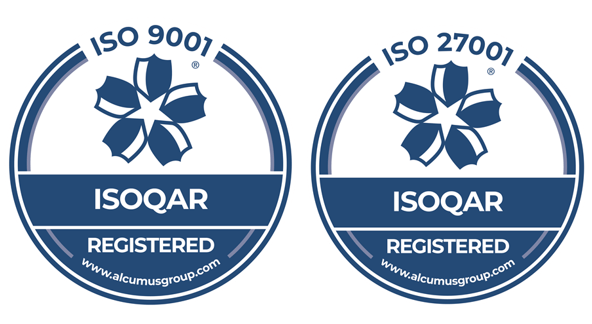Without question there’s been a dramatic increase in the digital demands placed upon public services as a result of the COVID-19 pandemic, and it’s true that these demands are unlikely to fall away as life returns to a sense of normalcy. One particular area where many of us will have experienced first-hand the impact of recent changes is the health service, and that’s what we’ll be discussing here today.
Digital Health
We know from our work with NWIS and GP Wales that there’s huge potential for this public service to become vastly more efficient with an intelligent digital strategy, and it would seem the Welsh Government is in agreement, having allocated £4.9 million to make public sector digital services better for the people of Wales.
To further explore the concept of a more digitised health service, and better understand the shifts that have taken place in this last year, we were keen to talk to professionals within the sector and so brought together two such individuals in conversation with Box UK Managing Director, Benno Wasserstein via a Business News Wales digital discussion, Streamlining Public Services: Focus on Health.
Our panel
Benno Wasserstein, Managing Director at Box UK
Working closely with his team, Benno inspires clients on their digital journey, ensuring together they develop exceptional software that is used by millions, disrupting industries and improving society.
Hamish Laing, Professor of Enhanced Innovation, Engagement and Outcomes, Swansea University and Chair of Digital Inclusion Alliance for Wales
Hamish was Executive Medical Director and Chief Information Officer at ABM University Health Board where he led a cross-sectoral review of clinical and digital strategies, co-authored its quality strategy, and established a programme for digital transformation. Appointed to a Professorial chair in Swansea University in 2018, Hamish is both Director of the Value-Based Health and Care Academy and Non-Executive Director of Life Science Wales Ltd.
Hamish additionally chairs the Digital Inclusion Alliance for Wales, an umbrella group for organisations working to promote a digital included Wales, and is vice-chair of the Digital Services for Patients and the Public Programme (DSPP).
Anne Marie Cunningham, Associate Medical Director for Primary Care, Digital Health and Care Wales
Associate Medical Director for Primary Care with Digital Health and Care Wales (formerly NHS Wales Informatics Service), Anne Marie is additionally a practising GP in South Wales and Vice Chair for the UK Faculty of Clinical Informatics. She also serves as a member of an advisory panel to the Digital Health CCIO Network – a community dedicated to bringing about greater clinical leadership and engagement in the use of informatics within the NHS.
Watch the recording of the discussion
Here’s what you missed
Key insights from what was a really interesting and informative discussion include:
Remote consulting isn’t entirely new, but doesn’t work for everyone
Research from the Royal College of GPs found that before lockdown around a quarter of GP appointments were carried out remotely, with about 70% face to face. Following lockdown however, these figures reversed with approximately 70% being carried out by video or phone.
Anne Marie spoke to us about this shift, confirming the overnight change in the way GPs could practice (and the challenges around getting clinicians set up for remote working) but also reminding us all that GPs are trained in remote consulting, albeit via the telephone, so there is some precedent for working this way.
We also learnt from Hamish that 82% of patients within Wales report the video consulting experience as being good, and 70% of clinicians say the same. But both speakers highlighted that in the more complex care cases, and for marginalised communities, in-person access to such services continues to be important. Indeed the Royal College of GPs would seem to agree saying that “moving forward, we envisage more of a balance in the way people access general practice services, perhaps with 50% face-to-face and 50% remote appointments”.
Data is key
Accepting that not all digital health services suit all patients, an interesting part of the discussion with Hamish and Anne Marie focused on the existing and potential use of data in being able to identify who needs what. An obvious example given was that of identifying patients who might have needed to shield during the pandemic, but playing this forward there are clear implications for the signposting of patients to in-person consultations for example, or even the management of particular conditions in particular ways.
The benefits of exposing relevant data to the patients themselves was also highlighted – and both of our panellists noted the upsides of this not only in improving transparency of care, but quality of data and associated decision-making too.
We must build for inclusion
A clear stumbling block for the wholesale adoption of digital health services is the question of inclusion i.e. the fact that not all people have equal access to the digital world.
People from more deprived populations or who are less well-educated are less likely to be online for example, as are some of those individuals who may need the greatest access to healthcare services such as the elderly and individuals with long-term conditions or health complaints.
Hamish explained the work being done to tackle these challenges by the Digital Inclusion Alliance (who bring together organisations from across Wales to drive digital inclusivity) and, though he was clear on the huge amount of work to be done on this front, underlined Wales’ ambition to lead the way on this front – both across the UK and globally – citing initiatives such as the Wellbeing of Future Generations Act and the recently-published Digital Strategy for Wales.
The role of the private sector
To continue the development of digital health services within Wales and ensure a level playing field when it comes to accessibility, both Hamish and Anne Marie were clear that the private sector has a number of roles to play.
Hamish for example highlighted how a key challenge for the NHS is achieving the agility needed to keep pace with changing public expectations, explaining how the private sector can help deliver this, particularly in light of the Welsh Government’s commitment to open architecture across NHS and social care systems. Hamish also emphasised the move towards partner rather than supplier relationships between public and private sector, with the effect that internal domain knowledge then becomes further enhanced with the addition of new external skillsets.
Anne Marie added to this picture, telling us how, with 800 staff, Digital Health and Care Wales has significant development capacity and that the real strength of private sector organisations in this instance is in building capacity within the team across key capabilities, such as data skills, service design, and user research.
The outlook
Both guests agreed that much progress has been achieved in the last 12 months and that the only way forward from this is just that – forward. Remote working is unlikely to disappear for example and not just because of the safety issue but because it meets people’s needs better, whether clinician or patient.
The importance of digital inclusion (or impact of digital exclusion) has also become much more known in this past year and there’s a hope that we might expect even more acceleration of results around this as we move forward now – enabling the health and care service to more proactively care for those who are most vulnerable.
What’s next?
The healthcare sector in Wales has seen significant change, and it will be interesting to track the progress of the multiple initiatives discussed with Anne Marie and Hamish over the coming months and years. At Box UK we’re proud to play a role in helping drive Wales’ digital health ambitions forward, enjoying the privilege of having worked with organisations such as the former NHS Wales Informatics Service and GP Wales. And our expertise in healthcare expands beyond Wales (and even the UK) too, not least via a long-term partnership with BMJ Best Practice to make clinical information quickly and easily accessible to medical practitioners. Get in touch today to find out more about these projects, and how we can help you to deliver your digital vision.

